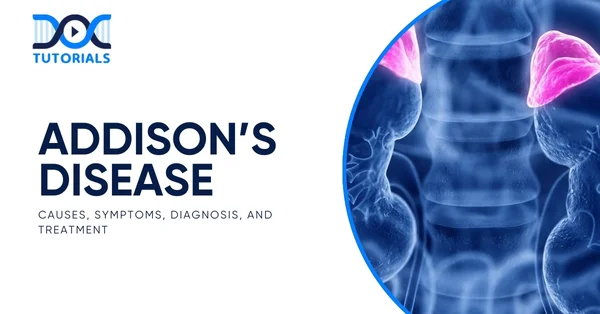Addison’s Disease: Causes, Symptoms, Diagnosis, and Treatment

Addison’s disease, or primary adrenal insufficiency, is a rare but dangerous disorder where the adrenal glands are not able to generate adequate amounts of certain hormones, which include mainly cortisol and aldosterone. The resulting hormonal deficiency can cause fatigue, low blood pressure, weight loss, and skin darkening, among other symptoms that, if left untreated, can disrupt normal life.
This guide deconstructs the major points of this chronic condition, including Addison’s disease symptoms, aetiology, diagnostic strategy, and current treatment.
Keep reading for a detailed insight.
What is Addison’s Disease?
Addison’s disease is a prolonged chronic condition where the adrenal glands, sitting atop the kidneys, are not able to produce adequate amounts of essential hormones, mainly cortisol and aldosterone. These hormones regulate fundamental bodily functions, including metabolism, blood pressure, and the body’s response to stress. When their levels fall, it may lead to symptoms such as fatigue, low blood sugar, muscle weakness, and a craving for salt.
The disorder advances gradually and typically goes unnoticed until intense symptoms appear. It is most commonly the result of an autoimmune destruction of the adrenal cortex. Addison’s disease is uncommon but is required to be treated with lifelong hormone replacement therapy to suppress the symptoms and avoid adrenal crisis.
What are the Causes of Addison’s Disease?
The primary and secondary causes include:
- Autoimmune Destruction
When the body’s immune system attacks and destroys the adrenal cortex, it results in a deficiency of hormones. This is the most frequent cause of Addison’s disease.
- Tuberculosis (TB)
Bacterial infection that can extend to the adrenal glands, cause damage, and affect hormone secretion.
- Other Infections
Infection by fungi, HIV, or specific viruses can affect adrenal function directly by causing inflammation or tissue destruction.
- Cancer Metastasis
Cancer in other organs of the body, like the lungs or breasts, metastasises to the adrenal glands and impairs their functioning.
- Adrenal Haemorrhage
Internal bleeding in the adrenal glands, commonly due to severe infection or trauma, leads to their failure, thus hampering hormone-secreting function.
- Genetic Disorders
Conditions such as congenital adrenal hyperplasia can interfere with the synthesis of hormones at birth, causing congenital chronic deficiency of hormones.
- Medications
Certain medications, particularly those employed to treat fungal infections or Cushing’s syndrome, can inhibit or destroy adrenal hormone production.
What are the Addison’s Disease Symptoms?
Addison’s disease symptoms usually arise gradually and may be very mild to begin with, hence presenting a challenge in early diagnosis. As the production of cortisol and aldosterone continues to decline, symptoms become more severe and easier to recognise. The following are the main symptoms of Addison’s disease and the reasons why they appear:
- Chronic Fatigue
The most frequent symptom is chronic fatigue. Hypocortisolism cripples the body’s capacity to produce energy, leading to chronic tiredness regardless of rest.
- Weight Loss and Reduced Appetite
Hormonal imbalance affects digestion and metabolism, often causing unintentional weight loss and a noticeable drop in appetite.
- Low Blood Pressure
Particularly when standing (postural hypotension), this symptom can cause dizziness, fainting, and lightheadedness due to aldosterone deficiency and poor fluid balance.
- Darkening of the Skin (hyperpigmentation)
Increased ACTH (adrenocorticotropic hormone) stimulates melanin production, leading to dark patches, especially around scars, joints, and mucous membranes.
- Salt Cravings
When aldosterone is low, the body loses sodium through urine, prompting intense salt cravings as it tries to restore balance.
- Abdominal Pain, Nausea, or Vomiting
Digestive symptoms occur because cortisol helps regulate gastrointestinal function; without it, discomfort, nausea, and vomiting may arise.
- Muscle or Joint Pain
Cortisol deficiency can trigger inflammation and pain in muscles and joints.
- Irritability and Depression
Mood swings, anxiety, and depression are common, reflecting the impact of hormonal changes on brain chemistry.
- Low Blood Sugar (hypoglycemia)
Cortisol helps maintain blood glucose. Without it, episodes of low blood sugar, especially in children, can occur.
What are the Risk Factors of Addison’s Disease?
While Addison’s disease does have some causative factors, some people are more prone to acquiring the disease under certain risk factors. They are identifiable and can result in earlier diagnosis and better treatment:
- Family History of Autoimmune Disease
Patients with autoimmune diseases like type 1 diabetes, Hashimoto’s thyroiditis, or coeliac disease are more likely to acquire Addison’s disease based on a common immune dysfunction that is predisposed to target the adrenal glands.
- Female Sex
Women are at risk of developing autoimmune conditions, including autoimmune Addison’s disease, possibly as a result of hormones and genes.
- Age of 30-50 Years
Addison’s disease is typically encountered in adults of this age group, but it may also occur earlier or later in life based on inherent risk factors.
- Chronic Stress
Recurrent physical or emotional stress can damage the adrenal glands and could precipitate symptoms earlier in individuals who are already at risk.
- Residing in Areas of High TB Prevalence
Where tuberculosis continues to be endemic, TB-induced adrenal damage remains a major risk factor.
What is the Diagnosis Process for Addison’s Disease?
Diagnosis of Addison’s disease is a synthesis of symptom evaluation, laboratory tests, and imaging examinations. Due to the incognito nature of the symptoms and their coincidental resemblance to other diseases, each diagnostic step is essential to obtain the diagnosis:
- Medical History and Physical Examinations
A doctor will check for signs such as chronic tiredness, loss of weight, changes in the skin, and low blood pressure. Examination for dehydration symptoms and inquiry about any underlying autoimmune disease is also done in certain cases.
- Blood Tests
Blood tests are employed to check cortisol, sodium, potassium, and ACTH levels. Low cortisol accompanied by elevated levels of ACTH usually establishes primary adrenal insufficiency. Additionally, low sodium and potassium levels establish the diagnosis.
- ACTH Stimulation Test (Synacthen Test)
This test is generally considered the gold standard. Synthetic ACTH is administered intravenously, and cortisol levels are measured before and after administration.
- Insulin-Induced Hypoglycemia Test
Applied occasionally if secondary adrenal insufficiency is suspected. Tests the body’s ability to release cortisol when stress is created by a blood sugar low enough to induce the release of cortisol.
- Imaging Tests (CT or MRI)
CT scans are useful in the detection of structural changes in the adrenal glands. If there is any suspected pituitary involvement, an MRI of the head can be performed.
- Autoantibody Tests
Screening for certain antibodies that indicate autoimmune adrenalitis, the most common cause of Addison’s disease, is required.
What are the Treatment Options for Addison’s Disease?
The treatment of Addison’s disease is designed to externally administer those hormones that the adrenal glands can no longer produce. With proper care, individuals can maintain active, healthy lives.
These are the most prevalent treatment choices:
- Corticosteroid Replacement Therapy
The treatment involves daily oral medications such as hydrocortisone, prednisone, or dexamethasone to substitute cortisol. They must be taken regularly to maintain normal hormone levels.
- Mineralocorticoid Replacement
Fludrocortisone is given to substitute for aldosterone, regulating sodium, potassium, and blood pressure. The dose is adjusted on the basis of blood tests and blood pressure.
- Higher Doses During Stress
When sick, undergoing surgery, or subjected to emotional stress, the body requires more cortisol. Patients are instructed to temporarily raise the corticosteroid dose under the advice of a physician as a measure to avoid adrenal crisis.
- Emergency Hydrocortisone Injection
Patients are trained to give themselves a hydrocortisone injection in case of acute illness or adrenal crisis, when oral medication is not possible.
Follow-up visits are essential to alter doses of medication, control side effects, and check electrolytes and blood pressure.
Can Addison’s Disease Be Prevented?
While Addison’s disease can’t always be avoided, especially when caused by autoimmune diseases, its risk of complications or late diagnosis can be lessened. Here’s how:
- Early Infection Treatment
Early treatment of infections like tuberculosis might avoid the risk of damage to the adrenal gland.
- Routine Health Checks
Routine check-ups might identify early symptoms in those with endocrine or autoimmune disorders.
- Genetic Counseling
For individuals with a history of autoimmune disease in the family, genetic counselling can provide information about possible risks.
- Stress Management
Stress management on a physical and emotional level can decrease stress on adrenal function in high-risk patients.
FAQs About Addison’s Disease
- What is Addison’s disease?
Addison’s disease is a disorder in which the adrenal glands do not produce sufficient cortisol and aldosterone, the hormones needed by the body.
- What are the early signs of Addison’s disease?
Early signs include fatigue, weight loss, low blood pressure, and darkening of the skin, which, if left untreated, may get even worse.
- How is Addison’s disease diagnosed?
Physicians employ blood tests, hormone level tests, stimulation tests, and imaging tests to diagnose adrenal insufficiency.
- Is Addison’s disease treatable?
No, but most individuals can control symptoms and live normally with daily hormone replacement therapy.
- Can Addison’s disease result in an emergency?
Yes, if left untreated, Addison’s disease will result in an adrenal crisis, a potentially life-threatening emergency that requires the immediate attention of a physician.
Conclusion
Addison’s disease is a rare, though severe, endocrine disorder with clearly defined clinical features and fairly specific diagnostic indicators. Aetiology, symptoms, risk factors, diagnosis, and treatment strategies are worth discussing in efforts at early detection and adequate management.
DocTutorials provides structured reading materials, expert video lectures, and high-yield notes designed specifically for the NEET PG exam. Topics like Addison’s disease are explained in simple language for easy understanding and to boost your exam preparation.
Check out our NEET PG courses today!
Latest Blogs
-

NEET PG Exam 2025- Date, Pattern, Marking Scheme, Subject Wise Weightage, and Exam Mode
NEET PG Exam 2025 is the ultimate gateway for medical graduates aspiring to pursue postgraduate courses in medicine, including MD,…
-

INI CET Exam 2025: Your Roadmap to Success – Key Topics, Strategies, and Lessons from Last Year’s Papers
The INI CET exam is more than just a test; it’s a significant milestone for many medical students aiming to…
-

INI CET Exam Success: Previous Year Question Papers & Ultimate Guide – INI CET PYQ
One can feel overwhelmed while preparing for the INI CET (Institute of National Importance Combined Entrance Test). A vast syllabus,…




